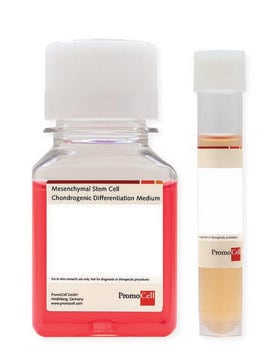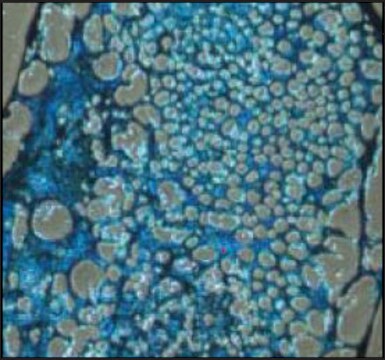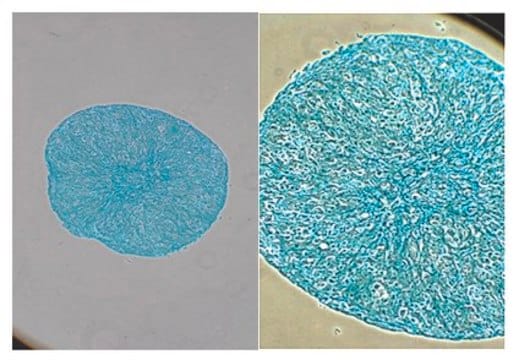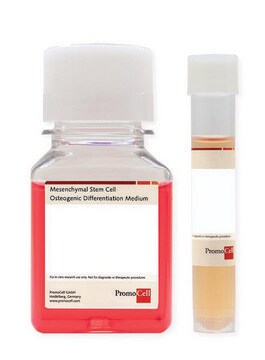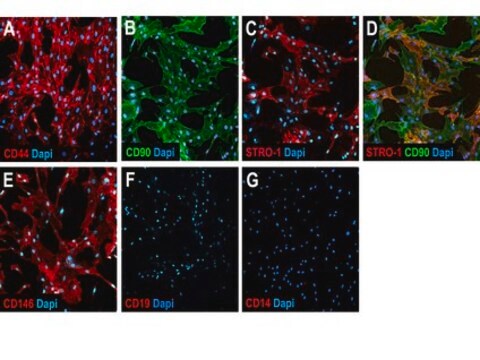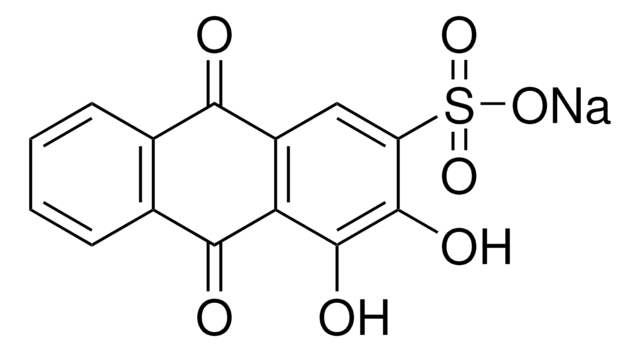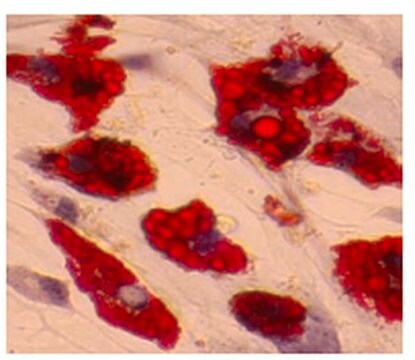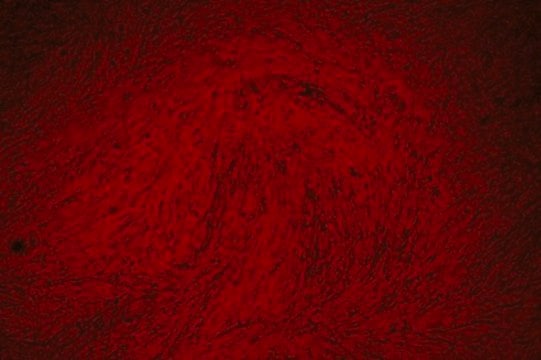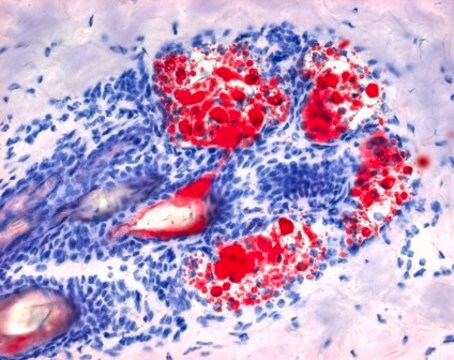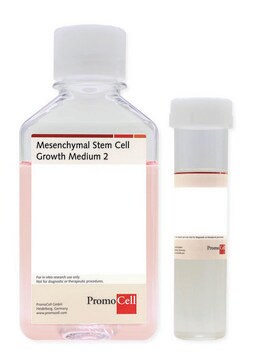SCR028
Mesenchymal Stem Cell Osteogenesis Kit
The Mesenchymal Stem Cell Osteogenesis Kit contains all the reagents necessary to readily differentiate mesenchymal stem cells to an osteogenic lineage as assessed by Alizarin Red staining.
Anmeldenzur Ansicht organisationsspezifischer und vertraglich vereinbarter Preise
Alle Fotos(1)
About This Item
UNSPSC-Code:
12352207
eCl@ss:
32161000
NACRES:
NA.81
Empfohlene Produkte
Qualitätsniveau
Hersteller/Markenname
Chemicon®
Methode(n)
cell culture | stem cell: suitable
Aufnahme
sample type mesenchymal stem cell(s)
Nachweisverfahren
colorimetric
Versandbedingung
wet ice
Allgemeine Beschreibung
Bone undergoes a continual remodeling process that requires the coordinated activity of two types of cells. Osteoclasts break down the bone matrix while osteoblasts deposits collagen, calcium, and phosphorous and other minerals to form new bone. The balance between the activity of osteoclasts and osteoblasts determine the mass and density of the bone. Many diseases of bone including osteoporosis, a common age-related phenomenon in post-menopausal women in which the bone mass has been greatly reduced, and osteogenesis imperfecta, also known as brittle-bone disease, are likely caused by the misregulation of osteoblasts and osteoclasts. Understanding the molecular mechanisms that underlie osteogenesis, the process by which new bone is formed is thus of critical importance.
Stem cell technology, particularly embryonic stem cells and/or mesenchymal stem cells, offer attractive sources of osteoblasts for tissue culture studies and for the biochemical dissection of the earliest steps involved in osteoblast cell determination. Mesenchymal stem cells are multipotent progenitor cells that have the capacity to differentiate into several mesenchymal cell lineages, including bone, cartilage and fat.
CHEMICON®′s Mesenchymal Stem Cell Osteogenesis Kit contains all the reagents necessary to readily differentiate mesenchymal stem cells to an osteogenic lineage as assessed by Alizarin Red staining. Reagents in the kit include two ECM coating molecules (collagen Type I and vitronectin) that have been shown to promote osteogenic differentiation of mesenchymal stem cells (Salasznyk, 2004) along with inducing reagents, dexamethasone, ascorbic acid 2-phosphate and b-glycerophosphate. Also included is Alizarin Red Solution, a staining solution that is used to detect the presence of calcium in bone.
Using CHEMICON′s Mesenchymal Stem Cell Osteogenesis Kit, we typically obtain >50% mature osteocytes from rat bone marrow derived mesenchymal stem cells. Efficiency of osteogenic differentiation may vary, depending upon the quality of the mesenchymal stem cells and if variations to the protocol are introduced.
For Research Use Only; not for use in diagnostic procedure.
Stem cell technology, particularly embryonic stem cells and/or mesenchymal stem cells, offer attractive sources of osteoblasts for tissue culture studies and for the biochemical dissection of the earliest steps involved in osteoblast cell determination. Mesenchymal stem cells are multipotent progenitor cells that have the capacity to differentiate into several mesenchymal cell lineages, including bone, cartilage and fat.
CHEMICON®′s Mesenchymal Stem Cell Osteogenesis Kit contains all the reagents necessary to readily differentiate mesenchymal stem cells to an osteogenic lineage as assessed by Alizarin Red staining. Reagents in the kit include two ECM coating molecules (collagen Type I and vitronectin) that have been shown to promote osteogenic differentiation of mesenchymal stem cells (Salasznyk, 2004) along with inducing reagents, dexamethasone, ascorbic acid 2-phosphate and b-glycerophosphate. Also included is Alizarin Red Solution, a staining solution that is used to detect the presence of calcium in bone.
Using CHEMICON′s Mesenchymal Stem Cell Osteogenesis Kit, we typically obtain >50% mature osteocytes from rat bone marrow derived mesenchymal stem cells. Efficiency of osteogenic differentiation may vary, depending upon the quality of the mesenchymal stem cells and if variations to the protocol are introduced.
For Research Use Only; not for use in diagnostic procedure.
Anwendung
Research Category
Stammzellforschung
Stammzellforschung
The Mesenchymal Stem Cell Osteogenesis Kit contains all the reagents necessary to readily differentiate mesenchymal stem cells to an osteogenic lineage as assessed by Alizarin Red staining.
Komponenten
Dexamethasone Solution: (Catalog No. 90357) One vial containing 100 μL of 10 mM dexamethasone in ethanol. Store at -20°C.
Ascorbic Acid 2-Phosphate Solution: (Catalog No. 2004011) One vial containing 500 μL of 100 mM ascorbic acid 2-phosphate in water. Store at -20°C.
Glycerol 2- Phosphate Solution: (Catalog No. 2004010) Three vials containing 1 mL of 1 M glycerol 2-phosphate in water. Store at -20°C.
Collagen, Type I: (Catalog No. 2004013) One vial containing 150 μg collagen Type I. Store at -20°C.
Vitronectin: (Catalog No. 2004012) One vial containing 150 μg vitronectin. Store at -20°C.
Alizarin Red Solution: (Catalog No. 2003999) One bottle containing 50 mL Alizarin Red Solution. Store at 2° to 8°C.
Ascorbic Acid 2-Phosphate Solution: (Catalog No. 2004011) One vial containing 500 μL of 100 mM ascorbic acid 2-phosphate in water. Store at -20°C.
Glycerol 2- Phosphate Solution: (Catalog No. 2004010) Three vials containing 1 mL of 1 M glycerol 2-phosphate in water. Store at -20°C.
Collagen, Type I: (Catalog No. 2004013) One vial containing 150 μg collagen Type I. Store at -20°C.
Vitronectin: (Catalog No. 2004012) One vial containing 150 μg vitronectin. Store at -20°C.
Alizarin Red Solution: (Catalog No. 2003999) One bottle containing 50 mL Alizarin Red Solution. Store at 2° to 8°C.
Lagerung und Haltbarkeit
Note: Kit components require two different storage temperatures.
Dexamethasone Solution, Ascorbic Acid 2-Phosphate Solution, Glycerol 2- Phosphate Solution, Collagen Type I, and Vitronectin should be stored at -20ºC. Alizarin Red Solution should be stored at 2° to 8°C.
Precautions
· Dexamethasone is an irritant and potentially toxic. DMSO is readily absorbed through the skin. Wear a lab coat and gloves when handling these solutions.
Please refer to the Material Safety Data Sheet at www.chemicon.com for further precautions.
Dexamethasone Solution, Ascorbic Acid 2-Phosphate Solution, Glycerol 2- Phosphate Solution, Collagen Type I, and Vitronectin should be stored at -20ºC. Alizarin Red Solution should be stored at 2° to 8°C.
Precautions
· Dexamethasone is an irritant and potentially toxic. DMSO is readily absorbed through the skin. Wear a lab coat and gloves when handling these solutions.
Please refer to the Material Safety Data Sheet at www.chemicon.com for further precautions.
Rechtliche Hinweise
CHEMICON is a registered trademark of Merck KGaA, Darmstadt, Germany
Haftungsausschluss
Unless otherwise stated in our catalog or other company documentation accompanying the product(s), our products are intended for research use only and are not to be used for any other purpose, which includes but is not limited to, unauthorized commercial uses, in vitro diagnostic uses, ex vivo or in vivo therapeutic uses or any type of consumption or application to humans or animals.
Signalwort
Danger
H-Sätze
Gefahreneinstufungen
Eye Irrit. 2 - Flam. Liq. 2 - Repr. 1B - STOT SE 2
Zielorgane
Eyes,Central nervous system
Lagerklassenschlüssel
3 - Flammable liquids
Flammpunkt (°F)
48.2 °F
Flammpunkt (°C)
9 °C
Analysenzertifikate (COA)
Suchen Sie nach Analysenzertifikate (COA), indem Sie die Lot-/Chargennummer des Produkts eingeben. Lot- und Chargennummern sind auf dem Produktetikett hinter den Wörtern ‘Lot’ oder ‘Batch’ (Lot oder Charge) zu finden.
Besitzen Sie dieses Produkt bereits?
In der Dokumentenbibliothek finden Sie die Dokumentation zu den Produkten, die Sie kürzlich erworben haben.
Kunden haben sich ebenfalls angesehen
Pooi Ling Mok et al.
International journal of molecular sciences, 18(2) (2017-02-18)
Mesenchymal stem cells are widely used in many pre-clinical and clinical settings. Despite advances in molecular technology; the migration and homing activities of these cells in in vivo systems are not well understood. Labelling mesenchymal stem cells with gold nanoparticles
Yin Yin Ooi et al.
World journal of stem cells, 5(1), 34-42 (2013-01-31)
To assess the capacity to isolate and expand mesenchymal stem cells (MSC) from bone marrow of CBA/Ca, ICR and Balb/c mice. Bone marrow of tibia and femur were flushed, cultured and maintained in supplemented Dulbecco's modified Eagle's medium. MSC immunophenotype
Zul'atfi Rahmat et al.
Stem cell research & therapy, 4(1), 12-12 (2013-01-30)
Mesenchymal stem cells (MSCs) are immunosuppressive, but we lack an understanding of how these adult stem cells are in turn affected by immune cells and the surrounding tissue environment. As MSCs have stromal functions and exhibit great plasticity, the influence
Unser Team von Wissenschaftlern verfügt über Erfahrung in allen Forschungsbereichen einschließlich Life Science, Materialwissenschaften, chemischer Synthese, Chromatographie, Analytik und vielen mehr..
Setzen Sie sich mit dem technischen Dienst in Verbindung.
